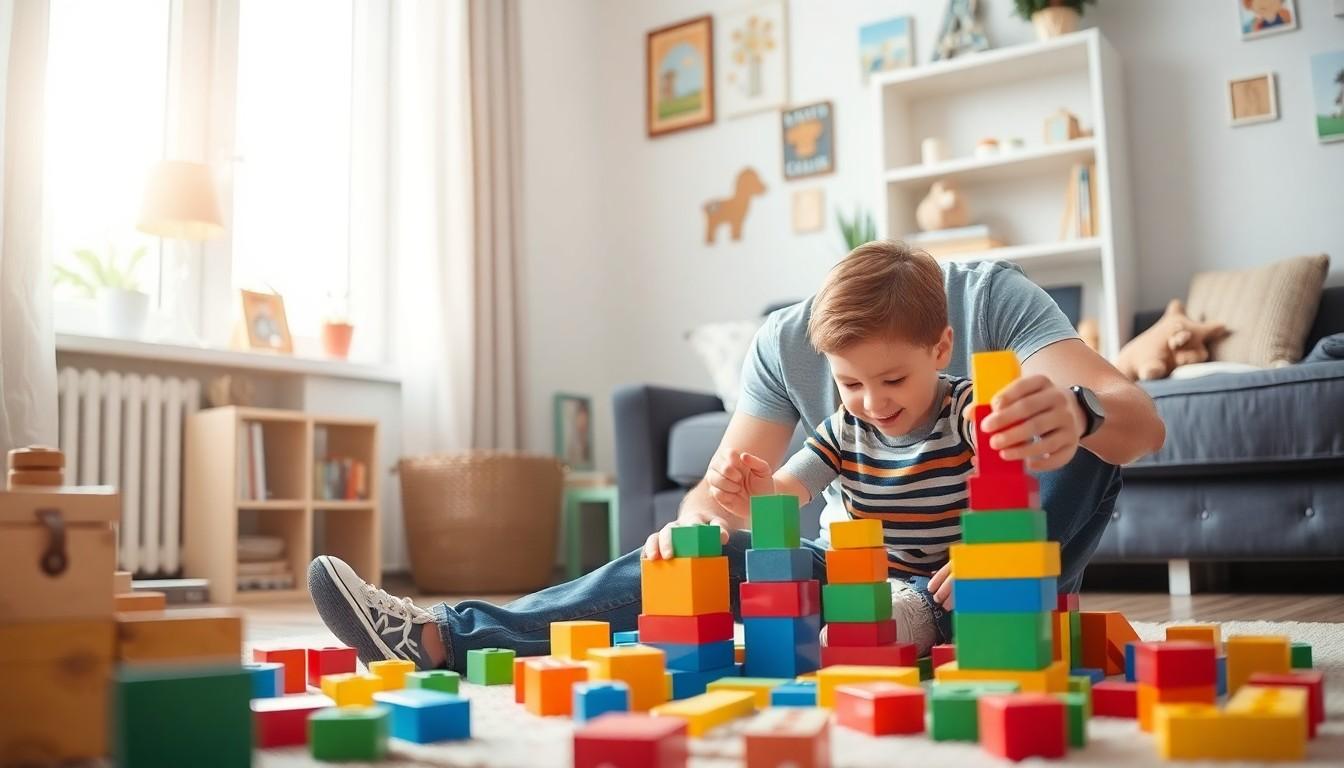Physical Address
304 North Cardinal St.
Dorchester Center, MA 02124
Physical Address
304 North Cardinal St.
Dorchester Center, MA 02124

Dads, let’s face it: parenting can feel like trying to assemble IKEA furniture without the instructions. You’ve got the tools, but where do you even start? Whether it’s diaper duty or navigating the emotional rollercoaster of teenage years, every dad can use a little guidance. The good news? You’re not alone in this wild ride.
From mastering the art of bedtime stories to perfecting the dad joke repertoire, effective parenting is all about balance. With the right tips and a dash of humor, any dad can transform from a bewildered bystander to a parenting pro. So buckle up and get ready to dive into some practical, light-hearted advice that’ll make you the superhero your kids think you are. After all, parenting isn’t just a responsibility; it’s an adventure filled with laughter, love, and maybe a few messy moments.
Active fatherhood plays a crucial role in child development and emotional growth. Engaged fathers contribute significantly to their children’s self-esteem, cognitive abilities, and social skills. According to research from the Journal of Marriage and Family, children with actively involved fathers show improved academic performance and behavior.
Role modeling stands out as a vital aspect of active fatherhood. Fathers who participate in daily activities teach essential life skills through observation. Engaging in play around the house enhances creativity and problem-solving skills in children. Moreover, taking part in school events fosters a deep connection between parent and child.
The emotional availability of fathers influences children’s wellbeing. Kids benefit from having fathers who openly communicate emotions and provide support. This open dialogue builds trust and encourages children to express their feelings. Furthermore, fathers who nurture their children cultivate resilience, equipping them for life’s challenges.
Active fathers also help break down societal stereotypes. By being present, they challenge traditional gender roles, showing that caregiving is not limited to mothers. This balanced approach promotes equality, teaching children the value of teamwork and respect in relationships.
One additional benefit includes the strengthened father-child bond. Spending quality time together strengthens relationships, providing a foundation of love and understanding that lasts a lifetime. The involvement of fathers not only enhances family dynamics but also contributes to a more stable home environment.
Lastly, active fatherhood creates a legacy of positive parenting. Generations influenced by involved dads often carry forward these values, shaping future parenting styles. Engaging fully in parenting activities leaves lasting impressions that impact children’s lives in profound ways.

Dads play a vital role in their children’s lives, and certain practices can enhance their parenting journey. These tips aim to foster deeper connections and more effective interactions.
Creating strong bonds with children starts with quality time. Sharing activities like playing games or reading bedtime stories enhances relationships. Engaging in shared interests, such as sports or crafts, cultivates trust and openness. Fathers should also express affection consistently, whether through hugs or verbal affirmations. Being present during significant moments strengthens emotional ties. Finally, patience during challenging situations promotes understanding, allowing for deeper connections.
Communication serves as a cornerstone in parenting. Listening actively shows children that their thoughts matter. Asking open-ended questions invites dialogue and encourages expression. Using clear and age-appropriate language enhances understanding. Acknowledgment of feelings fosters emotional intelligence, while positive reinforcement boosts confidence. When conflicts arise, addressing issues calmly models appropriate behavior. Practicing consistent check-ins with kids can create an atmosphere of openness, helping in emotional support and connection.
Balancing work and family life requires conscious strategy and focus. Dads must prioritize both responsibilities while ensuring family needs are met.
Setting clear priorities helps manage parenting responsibilities effectively. Identifying what matters to children often takes precedence, like school events, family dinners, or playtime. Time spent with children during these moments creates lasting memories. Dads can list tasks by urgency and importance, ensuring essential activities gain attention first. Evaluating commitments at work or home allows fathers to make informed choices. Achieving a balance between personal and professional life may enhance productivity and support family engagement.
Implementing time management strategies ensures a more structured day. Scheduling work tasks alongside family activities provides clarity. Utilizing digital tools, such as calendar apps, helps track important events and deadlines. Planning meals ahead reduces daily decision fatigue. Setting boundaries at work, such as designated hours for emails or calls, allows dads to devote quality time to children. Creating a weekly routine provides consistency, enabling a predictable environment for kids. Planning family outings or game nights strengthens connections, making family time a priority amidst busy schedules.
Active participation in a child’s activities fosters deeper connections. Dads can enhance relationships by sharing hobbies, whether it involves sports, arts, or reading. With each engagement, children feel valued and understood, boosting their self-esteem.
Collaboration in playtime activities opens avenues for teaching life lessons. Building blocks or solving puzzles clarifies concepts like teamwork and patience. Enthusiasm during these moments sparks curiosity and imagination in children, encouraging exploration.
Promoting consistency through routine activities proves beneficial. Regular family game nights or bedtime stories nurture trust and security. Dads can create an environment that fosters emotional well-being while ensuring children feel supported.
Attendance at school events demonstrates investment in their interests. Understanding a child’s passions helps dads relate to their experiences. Sharing moments at sporting events or art shows strengthens the parent-child bond.
Involvement in educational activities improves cognitive skills. Helping with homework or exploring educational games can enhance critical thinking. Kids who see their dads engaging in learning activities often mirror that enthusiasm.
Utilizing technology for shared experiences can be impactful. Video calls during work trips or online games maintain connection despite distance. Engaging in digital spaces encourages communication and relationship-building.
Maintaining an open line of communication is vital. Asking about a child’s day invites shared conversations and shows genuine interest. Dads that listen actively and encourage storytelling help children develop language skills.
Offering praise during activities nurtures confidence. Acknowledging achievements, big or small, establishes a positive environment. Kids thrive when they recognize their efforts are validated and celebrated.
Dads play a pivotal role in their children’s lives and the journey of parenting can be both challenging and rewarding. By embracing the tips shared in this article, fathers can navigate the complexities of parenting with confidence and joy.
Building strong relationships through quality time and open communication fosters a nurturing environment for children. As dads engage actively in their children’s lives, they not only enhance their development but also challenge stereotypes and promote equality.
Ultimately, every moment spent together contributes to a legacy of positive parenting that shapes the future. With laughter love and a commitment to growth, fathers can truly make a lasting impact.